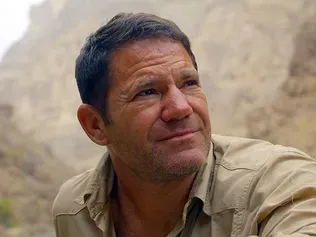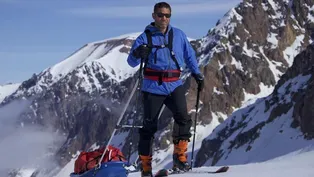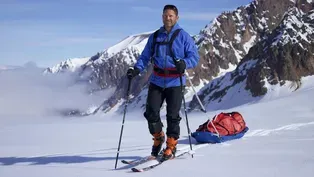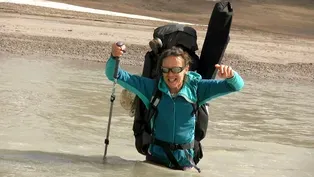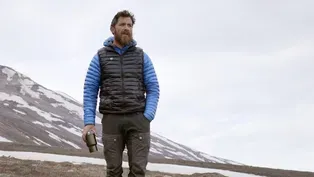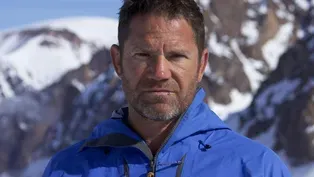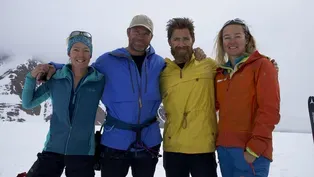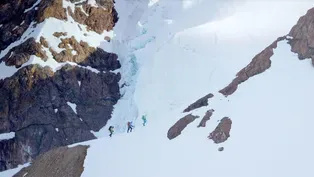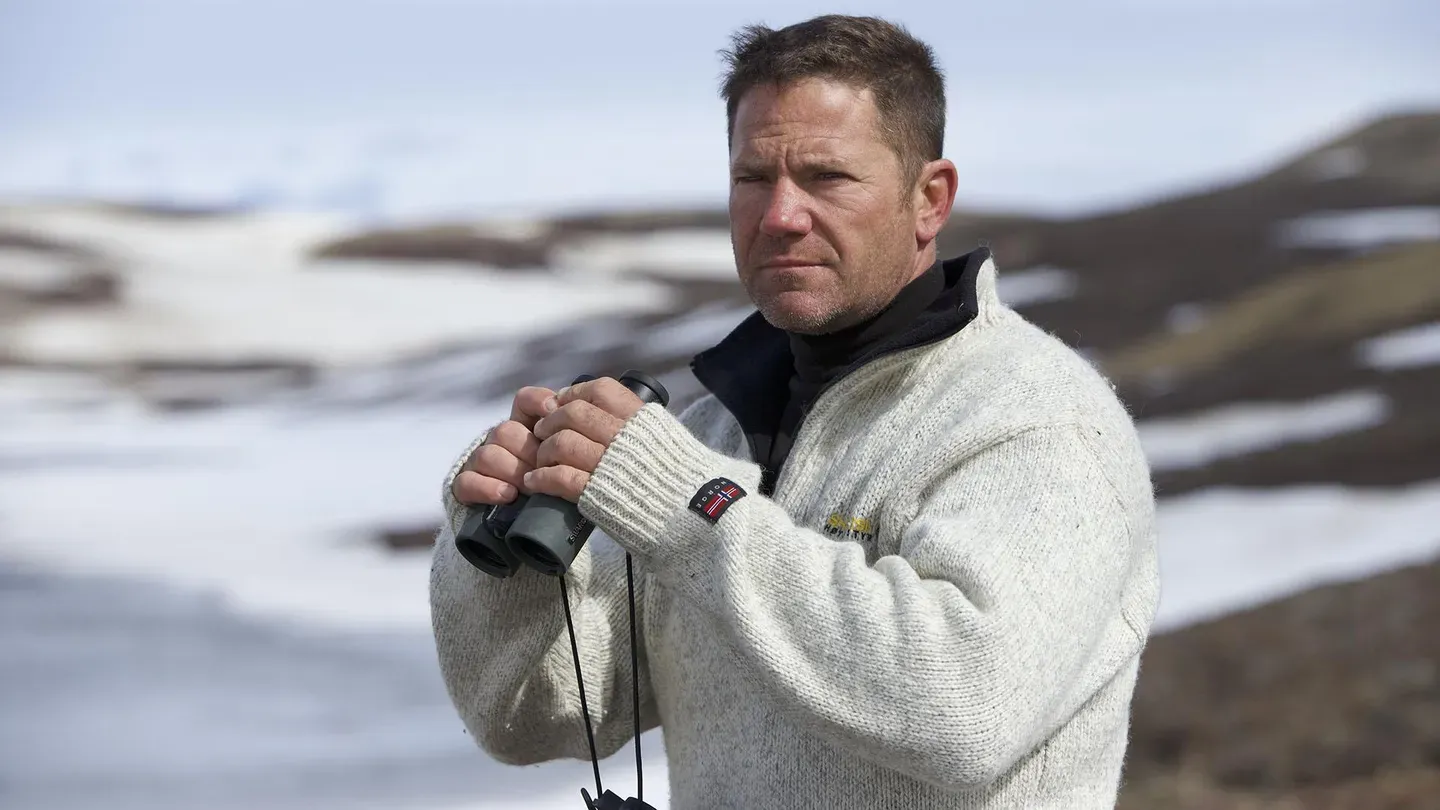

Greenland - Ice Mountain
Season 1 Episode 8 | 47m 44sVideo has Closed Captions
Climb alongside Steve Backshall as he attempts to summit an unclimbed Greenland mountain.
Follow Steve Backshall as he tries to summit a remote and unclimbed mountain in Greenland’s Stauning Alps. After facing quicksand, a river and a glacier to reach basecamp, the climb gives Steve a unique insight into a fast-changing environment.
Problems with Closed Captions? Closed Captioning Feedback
Problems with Closed Captions? Closed Captioning Feedback

Greenland - Ice Mountain
Season 1 Episode 8 | 47m 44sVideo has Closed Captions
Follow Steve Backshall as he tries to summit a remote and unclimbed mountain in Greenland’s Stauning Alps. After facing quicksand, a river and a glacier to reach basecamp, the climb gives Steve a unique insight into a fast-changing environment.
Problems with Closed Captions? Closed Captioning Feedback
How to Watch Expedition
Expedition is available to stream on pbs.org and the free PBS App, available on iPhone, Apple TV, Android TV, Android smartphones, Amazon Fire TV, Amazon Fire Tablet, Roku, Samsung Smart TV, and Vizio.
Buy Now

Meet Steve Backshall
Steve Backshall takes PBS behind his adventures, explains how the expeditions are chosen, and explores our role in protecting these magnificent locations.Providing Support for PBS.org
Learn Moreabout PBS online sponsorshipThere are still parts of our planet where no human has ever been... Amazing!
...until now.
I'm Steve Backshall, a naturalist and explorer.
Aah!
And I'm venturing into one of the wildest and most remote mountain ranges on the planet.
There are little muscles that I just don't use that are already screaming.
Deep in the Arctic and with an expert team of climbers, we're attempting to reach the summit of a mountain that no one has ever climbed before.
There is nothing that you can trust for your hands or your feet.
Every single move that we make is gonna have to be precise.
Through sinking sand... [Libby] Fresh avalanche there on our right.
...sheer-sided valleys... and over a mighty glacier... we're striving to reach the top of this rapidly changing world.
[Steve] Heads, heads, heads!
[Aldo] Watch out!
Whoa!
You OK, Steve?
[helicopter whirring] That is stunning!
[Steve] We're in Greenland, the least inhabited and most northerly country in the world.
[Steve] Wow!
With an expert team of Arctic explorers... we're flying into a remote mountain range called the Stauning Alps.
[Libby] Can we not go a little bit higher just so we can look down on them?
OK, yeah, sure.
Christie, can we go a little bit higher?
This area is so remote, many peaks here are yet to be climbed.
[Steve] This is amazing!
Ahh!
We'll attempt to reach the summit of one of them.
Is that the highest point?
That one there to our left?
[woman] Yeah.
[Steve] The route up looks incredible.
The mountain we're aiming for has no name.
It sits at the top of a vast glacier and towers over the surrounding landscape.
What do we think?
Are we all up for trying that?
[Libby] Yeah.
Totally.
[Keith] Yep.
We'll walk in from the foothills, so need a flat landing spot and somewhere to make our first camp.
Here we are.
[Aldo] Nice one.
This uninhabited mountain range sits on the eastern side of Greenland and was formed over 400 million years ago, when two continental plates collided.
They've since been sculpted by great rivers of ice called glaciers to create the jagged peaks and sheer valleys we see today.
Never made camp anywhere before where there are muskox just strolling around on the edge of camp.
They could not be less interested in us.
This is all down to the fact that we are so remote.
We're so far away from where human beings ever come.
Could not care less about us.
Aldo Kane is an ex-Royal Marine and is in charge of safety for this expedition.
[Steve] What do you think about that, Aldo?
It look like, from here, a Shetland pony.
Bigger.
Does look like a rhino also from here.
[Steve] Somewhere between a rhino and a Shetland pony.
It's a "rhony".
[laughter] [muskox grunts] It'll take us several days to reach the base of our mountain.
And we have no idea how long it will take to climb.
So which one's...
The success of this expedition will depend on the combined strengths of my team.
Then it kind of goes away... Libby Peter and Tamsin Gay are world-class mountaineers.
[Tamsin] Yeah, yeah.
So that would make sense that that there is what we can see curving round... Tamsin's climbed over 100 mountains... [Conversation continues, indistinct] and specializes in remote and hostile ascents.
The idea of doing something Where nobody's ever set foot before is utterly thrilling.
Ha ha!
Yeah, 50 years ago.
We're a bit late.
[Tamsin] Yeah, I love the idea of just not knowing and thinking, Well, I'll just have to manage somehow.
[Steve] We have a film crew of four, headed up by climbing cameraman Keith Partridge.
Filming an expedition like this requires so much kit and equipment that the only way of getting it around is using one of these.
We've got skis and climbing equipment which we're only gonna need at a later stage of the journey.
[Steve] This kit will be flown closer to our mountain.
And we'll head there on foot.
From this kit drop, we'll ski onto the glacier, where we'll establish a base camp from which to tackle the climb.
Our first barrier is this huge valley, Which takes melt water from eight glaciers down to the sea.
We got started quite early this morning, 'cause we've been noticing that the river levels change throughout the day.
So as you get later on in the day, they start to melt more in the glaciers, and it comes down and fills up the river.
So, we're hoping to get across before that happens.
The only thing is it's gonna be really, really cold right now, and it still looks really big.
[Aldo] That's about 50 meters over.
[Steve] Yeah.
But I reckon that's at least waist-deep, though.
[Aldo] Yeah.
[Tamsin] Just go for it.
[Aldo] Whoa!
Stand on it and give it a few hits.
[Tamsin] Oh, yeah!
It's quicksand.
As glaciers move, they grind rocks into dust, and mixed with water, this makes quicksand.
The water is one degree above freezing, and the last thing we need at this stage of the expedition is wet clothes.
Completely, preposterously, we're standing in our pants in the middle of Greenland.
[laughs] And we're crossing a river in our underpants with incredibly heavy bags on.
I'm using my wellies.
[Aldo] You look like you're the dude at festivals that empties out the portaloos.
[both laughing] Ooh, that's starting to get painful on the feet.
[Aldo] Oh!
That's cold.
Aah!
[moaning] [Libby] Ahh, my tummy button!
That's definitely... God, I'm short.
I am pretty short.
That's right up to where no man ever wants cold water.
Aah!
-Oh!
-Oh!
Ugh!
Jeez.
Ha ha!
Shh.
Ah!
Whoo!
[mutters] The most alarming thing is the build-up of silt and sand in here, and when you hit a patch of it, we're going right up past our knees like that.
[Steve] Just don't fall over now, Backshall.
That was really close.
I'm going up.
I'm ascending.
[Libby] All right.
Let's just get it over with.
[Steve] OK, back in shallow water.
[Steve] But we're not home and dry yet.
Whoa!
[Tasmin and Aldo groaning] [Aldo] Yeah.
OK. [Tamsin] Thanks.
[Libby] Come hard right.
[Libby] How come Keith's not sinking?
[Steve] No, you're all right.
[Tamsin] Like a penguin.
[Keith] Yeah.
[Tasmin] Crikey!
[Aldo] Quite scary when you go in.
[Libby] Yeah, it's horrible, isn't it?
[Tasmin] That's actually one of my worst sort of nightmares... [Aldo] Stuck in?
[Tasmin] Yeah.
I think that's the worst of it done.
We're through the melt water and back on firmer ground.
[Steve] Whoa.
These are fresh polar bear tracks.
That's the size of the footprint.
You see all the way there.
There are the toes, the claws at the front.
That is a big, big animal.
This bear was using the valley as a way of getting from the fjord, where the pack ice is gone, to the north where there is still a pack ice where they could hunt seals.
Just goes to show that up here, there is nowhere that you're completely safe from a bear.
[Steve] On this side of the valley, the mountains rise steeply ahead of us.
♪ It's a ten-kilometer walk to the heli-drop, which contains supplies for the next stage of our expedition.
It's been dropped near a glacir which leads to the base of our mountain.
We're now walking across tundr, a treeless habitat that comes to life in the short Arctic summer.
It can only exist where there's a permanent underground frost and is home to a unique group of animals and plants.
[Libby] Whoa.
Look at this.
I think it might be a muskox's pelvis.
That's fantastic, isn't it?
So I broke my pelvis once, actually, so I know that, I know these bones here.
It's like a, sort of, jigsaw.
How exciting.
Check that out!
So this is a muskox skull.
Just step back a little bit, Keith, and check this out.
So all around we have tundra just beginning to start coming into flower.
And then this bit around the head is alive.
That's a dwarf willow.
These are purple saxifrage.
That's a creeping cinquefoil.
We haven't even seen that one yet.
And these are Arctic buttercups.
What's happened is that all of the minerals, the phosphates, the nitrates have leached out of the skull and the skeleton And they've fertilized the soil.
In the death of this animal, the whole tundra has just burst into life.
That is the entrance to our glacier there.
And we're probably about seven kilometers away now from where we want to set up camp.
[Steve] The foot of the valley is littered with piles of loose, shattered rock.
We've come to-- all the stuff that's been dumped at the end of the glacier, which is up above us.
These rocky banks mark the point our glacier used to reac.
It's now receded far up the valley.
Covering this ground will be exhausting.
We've been going now for about nine hours.
On a big day like today, it's distracting your mind, I think, is the key.
Running through films in your head, thinking about plans for the future, and just doing things to take your mind to a different place for a little while, and ignore the pain in your shoulders.
But we need to stay alert.
[rocks falling in distance] Well, that's a good reason not to go any closer to the walls.
Couple of big old boulders just bounced down.
It's so unstable.
All of these rocks here are completely loose, they're coming down all the time, and it's really quite a dangerous spot to be walking through.
And there's some sign of avalanche on that far slope there.
[Steve] Best thing to do is just keep on moving.
[Steve] Arctic mountains are renowned for loose rock.
Snow forces its way into any cracks, then freezes and expands, breaking rocks apart.
It's a hazard we'll be living with from here on in.
[Steve] Come on, then.
Let's crack this last bit.
We've been walking for 11 hours but want to reach the kit drop before setting up camp for the night.
[Aldo] Don't think we're far off.
[Steve] I'd kind of like it to be about five minutes.
[Steve] Whoo-hoo.
[Tamsin] Look at that for a pile of stuff.
[Aldo] Awesome.
[Tamsin] Good job.
Honestly, I could just go to sleep right here, down on these rocks.
[chuckling] I'm absolutely knackered.
[Steve] At this time of year, the sun doesn't set, but as it skirts the horizon, we sleep, trying to regain some strength for our assault on the glacier tomorrow.
It's 6 a.m. and time to prepare for the day ahead.
Once we get up on the glacier, it'll be another week at least before I have a chance to clean off all the crust and sweat.
So I've decided to be courageous and take the plunge.
[Yelling] Oh, my God!
[shouting indistinctly] So this was all ice about 20 minutes ago.
Ohh.
Ohh.
That's so painful.
It's so painful!
Ah.
But I'm clean.
Hooray.
Today, we'll be crossing new terrain-- snow-covered rocks, then up onto glacial ice.
On the glacier and in sight of our mountain, we plan to establish a base camp from where we can start our climb.
To cover this ground, we need a whole new set of equipment.
From here on in, we're gonna be traveling on skis.
And in order to be able to ski uphill, we're using these.
They're called skins.
The way it works is, it slides in one direction and grips in the other.
So using these, you can go uphill, and we'll be dragging big sleds behind us that have all our gear in them.
[Aldo] There's two first-aid kits-- splint for femur, neck brace, another first-aid kit.
[Steve] The nearest settlement is 170 kilometers away.
And help could take days to arrive.
So we need to be prepared to deal with all eventualities.
Everything that we're taking up there is to do with glaciers, crevasse rescue, avalanche rock fall.
We'll each be dragging about 90 kilos.
The equivalent of my body weight.
All right, then.
Let's see if I can even move this thing.
[Steve] We have a vertical kilometer of ascent to do before we can even think about making a base camp.
Just put our backs into it and get stuck in.
We've got to keep the momentum up.
If you go to fast, it kind of gets all jerky.
So you got to stay sort of smooth and slow.
Definitely quite hard work.
Try and beat a real husky.
[laughs] Cross-country skiing's supposed to be the most perfect exercise in the world.
You're using more muscles than any other kind of activity.
And you feel it.
There are little muscles that I just don't use that are already screaming.
And doing big days hauling sleds uphill like this will be burning, well, 5,000 calories probably, which is four fish and chip suppers.
I'm gonna have a butt like two bowling balls by the time this is done.
The beauty of this landscape can lull you into a false sense of security.
Aldo, there's a rock fall here!
[Aldo] Yeah, mate.
We're coming.
[Tamsin groaning] We've got a big rockslide that's come down in front of us.
So we can't carry on skiing up this side.
We have to cross back over to the other side.
Yeah, just going to give it a little lift, Steve.
-Thanks, Steve.
-Hang on for a sec.
Our heavily laden sleds can only travel on snow or ice.
So we have to avoid the fallen rocks.
[Tamsin] Thank you.
[Aldo] Cheers.
[Steve] Nice work.
[Aldo] OK, I'll come back down and give you a push.
[Steve] So I think Tamsin's got me.
Oh, that's much easier.
Thank you very much.
[Tamsin] Nay bother.
[Steve] Yeah.
[Aldo] Clear.
[Libby] Yeah, just go.
♪ [rumbling noise] [Libby] Fresh avalanche.
[Aldo] Look at all this avalanche debris.
These steep cliffs are being warmed by the sun, making the snow loose and unstable.
This is gonna make the next stage of our journey more of a challenge.
This is the end of the glacier.
This huge wall of ice is rapidly melting and shrinking away.
Each year, it recedes another 20 meters further up the valley, leaving behind rocks and revealing the earth beneat.
[Steve] It's amazing to think that the ground that we're standing on right now hasn't been exposed to the open world for thousands of years.
And the glacier we're heading up to now is stunning and huge and impressive, but its days are numbered.
With the current rates of warming, many of Greenland's glaciers are set to disappear altogether by the end of the century.
This is a fabulous environment, but it's one which is right on the brink.
So I'm gonna treasure it while I can.
Ahead we're faced with a steep snow-covered slope leading up onto the glacier.
[Steve] So we're hoping that we're gonna crest this ridge here and we're gonna be up on a nice flat, if steep, blanket of snow.
Only thing is, is that underneath that blanket of snow are great crevasses, trenches that drop down 30, 40 meters into the glacier, and they are, probably the most dangerous thing for any mountaineer.
Even small cracks can open up into vast caverns in the ice.
Oh, got a crevasse.
[breathing heavily] Our skis offer some protection with crevasses, spreading our weight and allowing us to span any breaks in the ice.
Oh, it's burning.
With the harsh Arctic sun beating down, it's nearly ten degrees and the snow is starting to melt.
[Aldo] The snow is so slushy.
Skins aren't even working now.
[Aldo panting] Keep going, John.
Just a little bit more.
The film crew are really struggling to get up with all the equipment.
Our crew hope to come with us to the foot of the mountain, but the going is tough.
[Tamsin] It's just this friction underfoot that's the problem.
[Steve] Stay with it.
[Tamsin] It's bloody hard work, isn't it?
[Steve] Man down.
[Aldo] Could you help me up, please?
Thank you, mate.
[Steve] You all right?
[Steve] Mate, you've got a sweat on.
Did anyone tell you we're in the Arctic Circle?
That's gonna freeze on your face.
[Aldo] That was a good bit of graft, wasn't it?
[Steve] Yeah.
But we're up.
We've finally made it onto the glacier... ...a vast river of compacted ie that fell as snow thousands of years ago.
Glacial ice, like this, covers ten percent of all land on Earth.
It reflects the sun's rays back into space, acting as a giant cooling system and shaping the climate and weather patterns for the entire planet.
We've been skiing for nine hours, and eventually we can see the end of our glacier... and what lies beyond.
[Steve] Just now... starting to come for the first time into view of the mountain.
There it is, Our mountain.
Classic triangular shape.
The summit just screams out wanting to be climbed.
I kind of feel it's very human to stand at the bottom of a mountain and think, "What would it be like to be on top of that?
What would it look like?
What would the view be like?"
It's a powerful, powerful thought.
It quite gets to you, really.
It's a perfect location for base camp.
[Tamsin sighing] [Tamsin] It's important to just go around and have a bit of a probe at the snow just to check that we're not camping on top of any big holes, 'cause even something small could give us a real problem.
You know, if somebody just went down something tiny and, um, strained their ankle.
I mean, we're so far away from help that that would be a real problem for us.
But, ultimately, also, we don't want to have any major disasters where somebody-- somebody's entire tent disappears into a big crevasse.
Having established that the ice here is solid, we set about making camp.
[Libby] Making our bed for the night.
Make sure it's nice and flat.
[Steve] So tempting when you're tired to just whack the tent up and not worry too much about it, but every second you spend flattening out the snow pays dividends in the long runs.
[Libby] Get the tents up, get the stoves on.
Everyone needs plenty to drink and plenty of rest before the next adventures.
Did you find hot chocolate?
-Yes, it's in.
-Ah, thank you.
We have a bin.
Bin bag into the hole there.
We have communal seating all the way round on four sides.
Then we have the cooking area here.
This was done hastily.
Not exactly the way I would set it up but it's kind of working.
Here's the bar.
Things are a bit out of place.
This is where we keep the spoons.
Generally, everything in its place.
A safe kitchen is a clean kitchen.
[laughter] There's time for one last sleep before attempting the summit tomorrow night.
Night is the safest time to climb, when the sun dips behind the mountains and temperatures drop below freezing.
The snow becomes firmer, making it easier to travel on, and there's less risk of avalanche.
Ugh.
Morning.
[woman] How you doing?
[Steve] I'm battered.
My... legs, particularly, are really tired.
Um, taken a bit of a kicking over the last couple of days.
And... Do you know what?
That is amazing.
Look up there.
We've not seen any signs of the outside world.
Total silence.
You don't see any other people.
I mean, the zombie apocalypse could have happened and we'd never know about it.
You're just so isolated.
It's not until you see something like that that all of a sudden, you're reminded that there is an outside world beyond this little team.
In the modern world, it must seem that everything was discovered and explored centuries ago.
But that's not true.
There are still places that you can get to if you put in the work, where no one's been, like here, you know?
It's such an incredible opportunity.
This is what we came here for.
We're facing the hardest and most dangerous stage of the expedition.
Sleeping here at night, you can hear rock fall coming down all round us in this amphitheater.
I guess we just have to be careful.
These guys are super experienced at that side of things, so...
I make that 39 and a half.
Whoa.
Today we need to rest, refuel, and pack as lightly as possible for the climb tonight.
Operation hydration.
That's all the water that I can carry with me for the entire climb.
Supposed to be packing fairly lightly.
It's really easy 'cause you think, "But I might need that, I might need that."
You just have to think about it and then decide, "No, I'm not gonna take it," and be brutal.
Deciding if you can afford to take two teabags or just one.
-No toothbrush.
-No toothbrush.
[Tamsin] No toothpaste.
Every tiny extra gram you take, you'll feel it.
I'm carrying too much stuff.
[Libby] We've got enough to survive a night if we got shut down on the, you know, on our route for whatever reason.
Um, it wouldn't be comfortable, but we'd survive it, I reckon.
-Don't you think?
-Yeah.
Between them, Libby and Tamsin have over 40 years of climbing experience.
But even they are concerned.
[Libby] We really don't know what the conditions are gonna be like.
So we just don't know how fast we're gonna be able to move even on the simple terrain.
[Indistinct conversation] [Tamsin] Often you'll have a guidebook description of a route you're doing, so you know exactly what you need to take, what conditions you need.
We don't have that.
[Aldo] Looks like there's quite a drop down.
[Tamsin] If anything happens-- a broken finger isn't great, 'cause it might prevent you climbing.
So any tiny thing, we're just miles away from any help.
[indistinct chatter] [Tamsin] The whole team's safety is everyone's responsibility.
We're all totally reliant on each other.
[Steve] It's 5 p.m. And the temperature is dropping below freezing.
We're leaving base camp and most of the film crew behind.
Specialist climbing cameraman Keith is the only one who will join us on the climb.
Once we get moving with that sack of doom on my back, it's gonna feel like hard work, actually.
Full of camera kit, rucksack.
This sheer mountain towers over the glacier below.
We'll need crampons and ice axes to climb it.
♪ ♪ Our first 200 meters of ascent will be on a steep rocky slope covered in snow.
[Steve] So we're on our way.
We're wearing mini-cameras to record our every move.
And we're climbing in a buddy system.
Aldo, Tamsin, and I are in one group.
And Libby is with cameraman Keith.
It's just horrible snow.
[Aldo] It's just like a top layer of crust.
Foot goes through it, and then you go down well above your knees.
Momentum is your friend on this kind of terrain.
Stop for a second and you sink.
Keep moving and you might just get away with it.
This is hard work.
We haven't even started yet.
We need to reach the top of this snow slope before we can get a look at the route ahead and the summit we're aiming fo.
[Steve exhales] [Aldo] Watch out!
Bit of sliding snow.
Nearly there.
Amazing!
Yes!
For the first time, I can see what we're taking on.
And it's actually flipping massive.
From here we have a vertical kilometer to climb if we're to reach our goal.
The snow is giving way to more technically demanding rock.
There'll be no chance of sleep until we get back down.
And no one knows how long that will take.
OK, chocks away.
Tally-ho.
Toodle-pip and all that.
Tamsin takes the lead.
[Aldo] Should I let this run out, Tamsin?
[Tamsin] Yeah, that's a good idea, Aldo.
We're roped together.
If one of us falls, the others must use their strength and weight to save them.
[Aldo] All right, Steve.
You've basically got all that rope between you now.
[Steve] Yep.
Normally with climbing, rock is your friend, giving you solid hand and foot holds and something to anchor to for safety.
But it's pretty clear this isn't going to be that sort of climb.
Every single rock you're standing on is coming away.
[Tamsin] Nice one, Steve.
Right now, this is less like climbing and more like tiptoeing along a wire.
Just watching every single footfall, trying not to dislodge anything.
And that's not easy because everything... is ready to go.
♪ ♪ [rocks cascading] Watch out!
[Aldo] Rocks.
Look right.
[Steve] Heads, heads, heads!
You OK, Steve?
[Steve] Yeah!
After a while, the sound of rock fall starts to wear on your nerves.
In usual climbing, you hear it once in a blue moon, and it's a bad, bad sign.
On ground like this, it becomes almost constant.
Faced with sheer loose rock, the only thing that will keep us safe is total concentration.
If we allow our minds to wander even for a second, the consequences could be fata.
And with no prospect of sleep, this is gonna be a long night.
I'm out of water already.
The intensity of the climb, hour after hour, is exhausting.
[Tamsin] It's--it's hard, isn't it?
It's tenuous.
It's really quite serious.
We're not even halfway up, and it looks like worse is yet to come.
♪ [Tamsin] Potentially be a struggle up there.
Got quite a lot of sort of weaving to do between these rock towers.
Ahead are three rock pinnacles, steeper than anything we've faced so far and overhanging in places.
♪ ♪ [Steve] It just keeps getting worse and worse.
[Tamsin] When you go through that section there, Aldo, both loose on either side.
Like everything else.
[Aldo] OK, I'm underneath you.
We're taking it in turns to lead the climb while the others belay, acting as an anchor.
♪ Tamsin has nowhere to secure the rope.
She'll have to rely on her own bodyweight to stop me if I fall.
OK, mate.
[Steve] I've got a couple of choices of footholds.
And they're all... rubbish.
I'm in danger of knocking something big down.
Whoa!
[panting] There you go.
[Tamsin] If you want to sit astride...
I've made it up to Tamsin's precarious position.
Now, it's Aldo's turn.
[Aldo] OK, I'm climbing.
♪ [Steve] Whoa... Any pressure on these rocks could send them tumbling.
Whoa!
[rocks falling] Oh, I hate that sound.
[Tamsin] Aldo, when you get there, just sit astride that.
Perfect.
Great.
Lovely.
[Aldo] Cold toes.
That is stunning over there.
We've safely navigated the pinnacles, but have been awake for over 20 hours, and it's becoming harder and harder to concentrate.
Oh!
If anyone's interested, it's... 2:30 in the morning.
[Aldo and Tamsin laugh] It plays with your nerves.
Just always... tiptoeing.
Absolutely appalling in every respect that you should see why these mountains remain unclimbed.
Half past 3:00 a.m.
I think you feel it so much more as well when you're tired and hungry and thirsty.
[Steve] How long have we been on this route now?
It's half past 4:00 in the morning.
I can't remember now.
[Aldo] I think we're about 50 meters from the top, from the summit now.
And that's... quite satisfying.
[Steve] Be even more satisfying if we get to the top.
It's not about getting to the top.
It's about taking part, Steve.
[Steve laughing] The summit finally looks to be within reach.
Last push.
♪ [Aldo] Is that the summit?
[Steve] Yep.
[Tamsin] Nearly at the top.
One last snow ridge to go.
Nearly there.
[Tamsin] Great.
[Steve] Yes!
[Tamsin] Not bad, eh?
[Steve] What a perfect summit.
[Aldo] It's beautiful, isn't it?
Wow!
Great job, Aldo.
[Aldo] Been a journey and a half.
[Steve] Yeah, you can say that again.
Well done.
Thank you.
[Tamsin] Thank you.
[Steve] That was amazing.
[Tamsin] Well done.
[Steve] What do you think?
[Aldo] Stunning.
It's breathtaking, isn't it?
[Tamsin] Every direction, you look it's stunning but in a slightly different way.
Look at those ones there.
So dramatic.
From the peak, we can see at least 70 kilometers in every direction.
Back to the melt water river, the steep rocky valley, and down to our mighty glacier.
Moments like this are the reason that we do expeditions.
The reason that you put yourself through all of that heartache and hardship and sweat and stress and fear is for moments like this when you're standing in a place that no one has ever stood before.
We are the only human beings in this entire empty landscape.
There are few more remote placs in the modern world.
But the Arctic is warming twice as fast as the rest of the planet.
And much of this environment is living on borrowed time, making this moment, this summi, all the more special.
Having this... just us... up here on our summit.
Yeah, won't forget this in a hurry.
[Inhales] [Exhales]
Episode 8 Preview | Greenland - Ice Mountain
Video has Closed Captions
Climb alongside Steve Backshall as he attempts to summit an unclimbed Greenland mountain. (30s)
Video has Closed Captions
Many of Greenland’s glaciers are expected to melt altogether by the end of the century. (2m 59s)
Video has Closed Captions
The team has come to Greenland for an extraordinary challenge. (4m)
Video has Closed Captions
At the edge of camp, a muskox wanders the grounds. (1m 2s)
Video has Closed Captions
Steve and a team of experts ascend a mountain that no human has climbed before. (2m 41s)
Video has Closed Captions
During their expedition in Greenland, the team is forced to trek across a frigid river. (2m 32s)
Video has Closed Captions
Expedition continues in Greenland as Steve aims to summit a steep mountain. (1m 53s)
Providing Support for PBS.org
Learn Moreabout PBS online sponsorshipSupport for PBS provided by:
